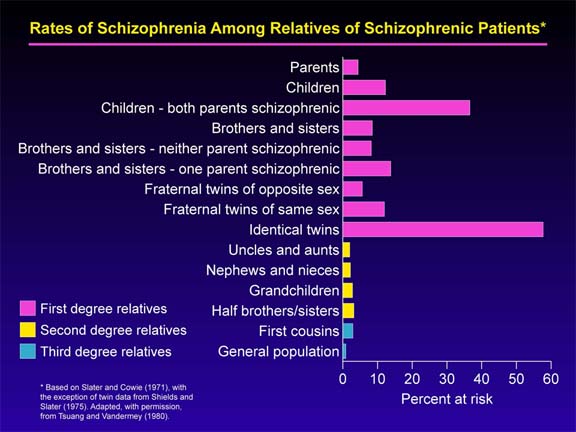Possible Causes
Before we start to talk about schizophrenia, this video clip below may help to provide you with some general ideas about this disorder. So sit back and enjoy!
The causes of mental illness are linked to several factors which can be summarised into three main groups:
Ÿ Biological factors which arise from physiology, biochemistry, genetic make-up and physical constitution
Ÿ Psychological factors including the person's upbringing, emotional experiences and interactions with people
Ÿ Social factors that are associated with the person's present life situation and socio-cultural influences
However, no single cause can account for schizophrenia. Rather, it appears to be the result of multiple "hits". Here we will focus on some of the biological factors.
Abnormalities in Brain Structure, Circuitry, and Chemicals
Brain scans using magnetic resonance imaging (MRI) have shown that there are a number of abnormalities in the brain's structure associated with schizophrenia. Such abnormalities can cause nerve damage and disconnections in the pathways that carry brain chemicals.
1. Abnormal Brain Activity and Volume.
Imaging techniques have revealed abnormal brain activity and shrinkage (reduced volume) in the brains of people with schizophrenia. Of particular importance are those in the prefrontal cortex , which contains the white matter of the brain, and the temporal lobes , which contain the limbic system.
Shrinkage of the prefrontal cortex can damage nerve cells and impair the connections that are required for verbal memory, attention, decision-making, reasoning, aggression, and meaningful speech. Impairment in the left side of the cortex is also associated with auditory hallucinations (hearing voices).
Shrinkage in the limbic areas of the brain is associated with problems finding words. The limbic areas of the brain contain the hypothalamus (controls physiological functions), amygdala (responsible for arousal and emotional states), and hippocampus (the part of the brain that makes memories). A number of studies have specifically noted smaller left hippocampi in people with schizophrenia.
2. Abnormal Brain Chemicals.
Schizophrenia is associated with an unusual imbalance of neurotransmitters (chemical messengers between nerve cells) and other factors.
Abnormal Circuitry
Abnormalities in brain structure are also reflected in the disrupted connections between nerve cells that are observed in schizophrenia. Such miswiring could impair information processing and coordination of mental functions. For example, auditory hallucinations may be due to miswiring in the circuits that govern speech processing. Strong evidence suggests that schizophrenia involves decreased communication between the left and right sides of the brain.
Genetic Factors
Schizophrenia undoubtedly has a genetic component. (refer to graph on the right for clearer view) Current evidence suggests that there are a multitude of genetic abnormalities involved in schizophrenia, possibly originating from one or two changes in genetic expression. Scientists are beginning to discover the ways in which specific genes affect particular brain functions and cause specific symptoms.
Infectious Factors
The case for viruses as a cause of schizophrenia rests mainly on circumstantial evidence, such as living in crowded conditions. The risk is higher for people who are born in cities than in the country. The longer one lives in the city, the higher the risk. The following are some studies suggesting an association:
Ÿ Winter and Spring Births: The risk for schizophrenia worldwide is 5 - 8% higher when colds and viruses are more prevalent.
Ÿ Large Families: The risk for schizophrenia is also greater in large families in which there are short intervals between siblings (2 or fewer years). Such observations suggest that exposure to infection early in infancy may help set the stage for later development of the disease.
Ÿ Pregnant Mother's Exposure to Viruses: The mother's exposure to viral infections such as rubella, measles, chicken pox, or others while the infant is in the womb has also been associated with higher risk for schizophrenia in her child.
Loss of Oxygen around the Time of Birth
Many studies have reported an association between schizophrenia and problems surrounding birth, particularly those that cause oxygen deprivation, which could affect the nerve growth or structure in the developing brain. Specific complications that have been associated with such a higher risk include:
Ÿ Prolonged labor
Ÿ Bleeding during pregnancy
Ÿ A short gestation period and low birth weight
Psychological Factors
Although parental influence is no longer believed to play a major role in the development of schizophrenia, it would be irresponsible to ignore outside pressures and influences that may exacerbate or trigger symptoms. The prefrontal lobes of the brain, which are the brain areas often thought to lead to this disease, are extremely responsive to environmental stress. Given the fact that schizophrenic symptoms naturally elicit negative responses from the patient's circle of family and acquaintances, it is safe to assume that negative feedback can intensify deficits in a vulnerable brain and perhaps even trigger and exacerbate existing symptoms.
References
Information taken from http://health.nytimes.com/health/guides/disease/schizophrenia/print.html
No comments:
Post a Comment